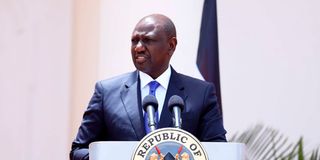
President William Ruto. M-Pesa users, landlords and consumers are among the biggest losers in President Ruto’s Sh3.641 trillion budget that seeks to introduce new tax measures and end state-funded subsidies.
Digital advertising companies, including multinationals such as Facebook’s parent firm Meta and Google’s Alphabet, are set to take a hit in the new tax law assented to by President William Ruto following the ratification of a 15 percent excise duty on digital ads on alcoholic beverages and gambling activities.
The law, which comes just months after a proposal to introduce the same at a 20 percent rate was shot down in the collapsed Finance Bill 2024, is pegged on the shift of advertisements on alcoholic products, betting and prize competitions shifting to digital platforms following the introduction of a tax on the items on TVs, print media, billboards and radio stations.
The introduction of the tax on mainstream media advertisements of the items last year heavily hit the companies and advertising agencies, which have been reaping big from the rapid growth in gambling over the past decade, leading to multi-billion-shilling spending on ads.
In gambling, the impacted companies will include those engaged in betting, gaming, lotteries as well as prize competitions.
The introduction of the new tax comes at a time the referenced gambling activities have been slapped with an excise tax increment from 12.5 percent to 15 percent in the same raft of laws.
The new set of laws have also repealed the Digital Service Tax (DST) which was previously levied at 1.5 percent rate, instead replacing it with the Significant Economic Presence (SEP) tax to be payable by a non-resident person whose income from the provision of services is accrued in or derived from Kenya through a business carried out over a digital marketplace.
The amendment effectively stipulates that the effective rate is three percent, determined as 30 percent of the deemed taxable profit, which itself is calculated as 10 percent of the gross turnover earned by the non-resident.
The new tax on digital betting ads is expected to power a significant boost in government revenue collections as the industry retains the record of a substantial advertisement spend compared to other sectors.
Latest statistics from the Communications Authority of Kenya, for example, shows that gambling sector advertising expenditures grew at the fastest pace during the three months ending September 2024, having more than doubled to Sh2.5 billion up from the Sh1.1 billion spent during the quarter ended June.
Overall, gambling accounted for the second-largest share of the total ads expenditure during the review period at 14 percent, trailing the media industry which led at 19 percent.
Other sectors that recorded significant increments in spending during the period included clothing, fabrics, and footwear which posted an 84 percent jump from Sh23 million to Sh42 million, as well as media whose expenses rose 49 percent to Sh3.5 billion up from Sh2.4 billion.
“Specifically, TV has the greatest spending, with radio coming in second. Media have the highest spending on TV while Financial Services on radio. Corporate and multi-brand have the highest spending in print,” wrote CA in its latest audience measurement and industry trends report.
“The predominant allocation of advertising spending is directed towards free-to-air TV, highlighting its central role in the advertising landscape. This emphasis on free-to-air TV underscores its effectiveness in reaching a wide and diverse audience.”










